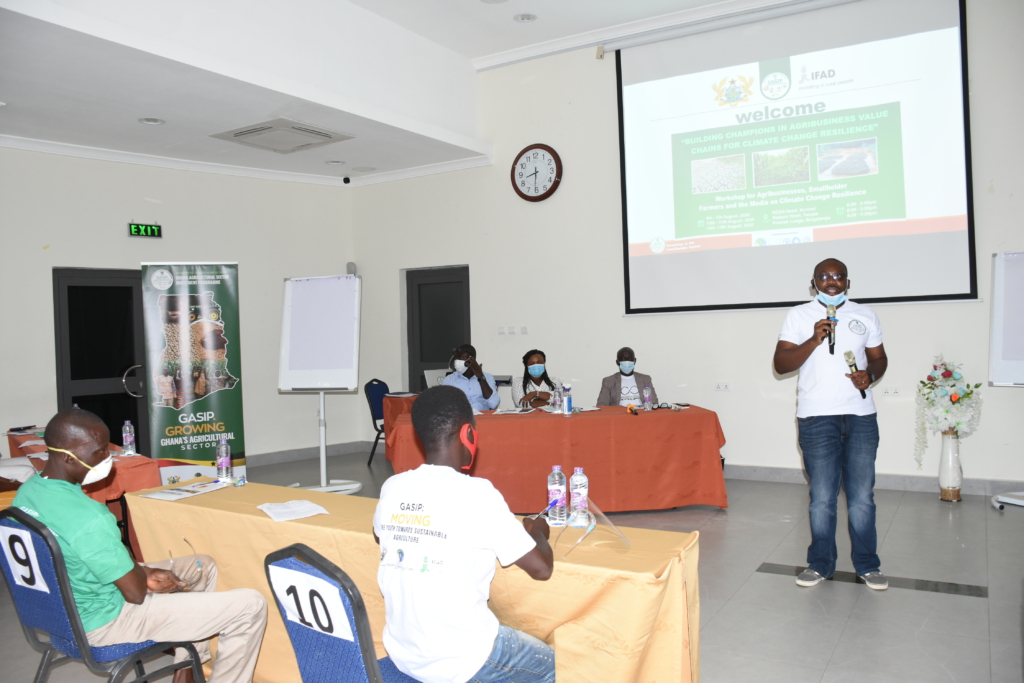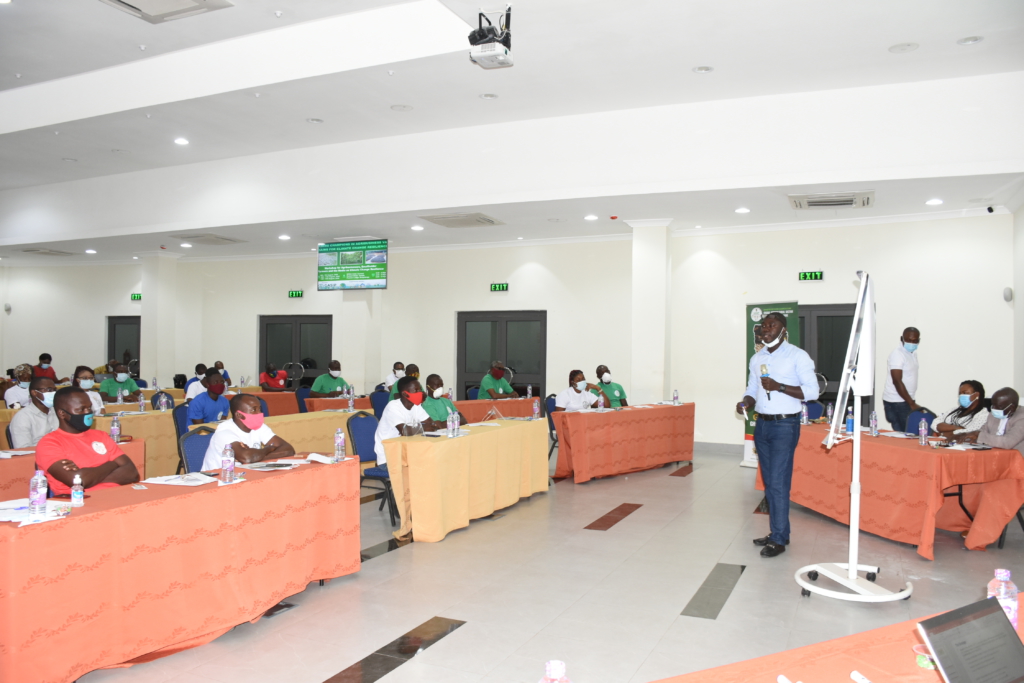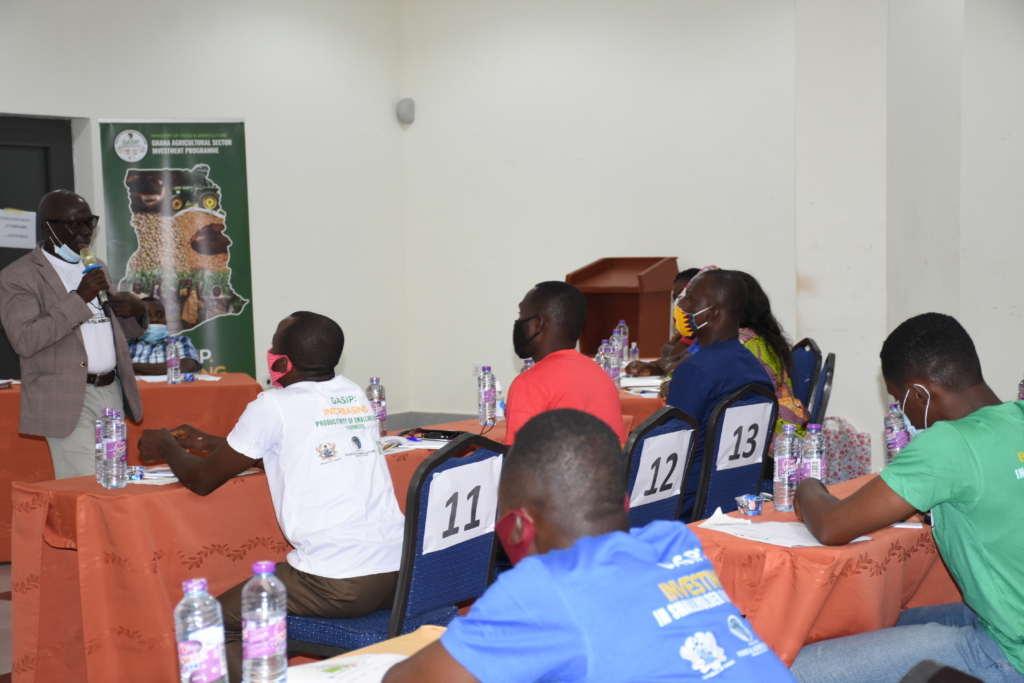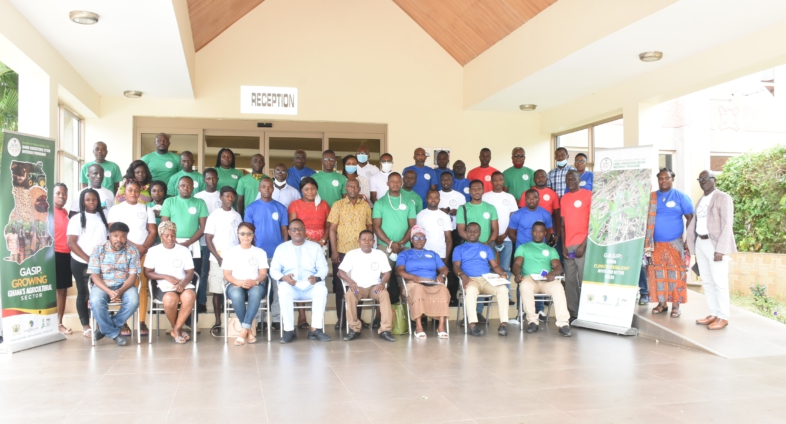Sixty thousand farmers across the country are expected to be empowered in a Climate Change Resilience programme through a nationwide climate change mainstreaming training.
The move is an initiative of the Ghana Agricultural Sector Investment Programme (GASIP) of the Ministry of Food and Agriculture.
This is being done by training 150 persons constituting 80 smallholder farmers and 70 value chain drivers, across Ghana for onward skill dissemination to the beneficiary farmers.
At a two-day stakeholder meeting in Kumasi, Climate Change Adaptation Manager of GASIP, Dr Edmund Kyei Akoto-Danso, says the workshop is meant to create Climate Change mainstreaming champions.
“Last year we worked with 60,000 farmers and can’t bring them all here, so we brought the people that we see as leaders to be able to translate what we are doing to the smallholder farmers.
At the end of the day, we believe these trainings will go to impact the 60,000 farmers while they are empowered to serve as climate change champions and focal contacts in terms of climate change issues at their respective operational areas.”

The workshop
The workshop under the theme, ““BUILDING CHAMPIONS IN AGRIBUSINESS VALUE CHAINS FOR CLIMATE CHANGE RESILIENCE”, was for Agribusinesses, Smallholder Farmers and the Media on climate change resilience measures.
It is meant to build their capacity on the climate change subject as well as help especially farmers to lead the climate change solution drive.
The workshop also ensured that the commercial business partners and their farmers came to a common understanding of climate change, common concepts in climate change adaptation, and the terminology in climate information.
“It will build a network of climate change champions and focal contacts through whom virtual and other forms of climate change training and capacity building can be channelled.
And they will understand climate information, future changes in climate, and implications for changes in hazards and risk, possible impacts, and identify situations they can cope with and others that they have to adapt to.”
GASIP National Programme Coordinator (NPC), Mr Klutse Kudomor, reiterated the need for participants to understand the strategies and policies that will help reduce the concentration of greenhouse gases in the atmosphere either by cutting down on emissions or increasing their capture.
He further emphasized that, “if we were to succeed in building champions, the Commercial Business Partners were the front-liners to the Farmer Based Organization (FBOs) and GASIP is structured to work through these business partners and the FBOs.”
From a 25 percent disbursement in May 2019 of the ASAP Grant for Climate Change related activities, about 70 percent has so far been disbursed in June 2020.
As a result, many training sessions for agricultural agents have been carried out across the country with over 53 Commercial Business Partners and over 1000 Farmer Based Organizations (FBOs) members.
This year the target to access funds is about 60,000.
“GASIP has done a lot so far for smallholder farmers, I believe it would grow from strength to strength. The sky is the limit,” Mr. Kudomor added, revealing that a new phase of the project with new activities is in the offing.

Climate Smart Agriculture
The workshop was meant to take farmers and value chain drivers through the concept of climate-smart agriculture.
Officials at the Ministry of Food and Agriculture says the move is also part of measures to implement the national climate change policy through the climate-smart agriculture and food security action plan.
Senior agricultural officer in charge of climate change and natural resource management at the ministry, Kingsley Agyemang, is positive this initiative critical to cushion farmers from the shocks of uncertainty in the cultivation of their yields.
“By this, we talk about the need to improve soil structure and fertility. We have taken the participants through a number of strategies that they can do on their farms to help improve soil moisture content and for that matter the structure”, Mr Agyemang said.
Both the farmers and the value chain drivers were also taken through the need for Climate Information Services.
The Director of Crop Services at the ministry, therefore, advised that as much as possible they (farmers and VCD) must access weather information services either from the private sector or the Ghana Meteorological Agency to help them make informed decisions about their farming.
Mr Agyemang added that “with this information, they would be able to determine what time to prepare their lands, which crop variety you should cultivate and with this, you would minimize cost and maximize profit because you (farmer) know of a certainty what you are supposed to do to make money, have food and above all improve your livelihood”.
There have been calls for the spread of conservational agricultural practices to farmers in the face of the harsh impact of climate change on farmers.
Founder and Director for the Centre for No-Till Agriculture, Opanin Dr Kofi Buah, explained to the participants the need to seek expert advice when deciding on what form of practice to employ on their farms. This is to help them increase productivity as well as enhance farm yields while mitigating the impact of climate change.
Participants were from Bono East, Eastern, Oti , Ashanti, Central, Greater Accra, Volta, and Western regions.

GASIP’s progress
GASIP’s goal is to contribute to sustainable poverty reduction in rural areas of Ghana and its development objective is to enhance the profitability and climate change resilience of agribusinesses and smallholders.
It is a national programme for a period of six years implementable through two cycles of three years each which became effective in May 2015 and is scheduled to be completed on 30 June 2021 and closed on 31 December 2021.
Latest GASIP supervision mission (SM) findings in December 2019 suggested that GASIP has partnered with 53 VCDs which in turn have partnered with 1,200 FBOs mainly for producing rice, maize, soya, cassava and some vegetables across all the major agroclimatic zones in the country.
GASIP has supplied USD 13.6 million as matching grant support to the beneficiaries to ensure their access to quality and timely inputs through the VCDs.
GASIP’s Crop Yield Surveys have also suggested that the beneficiaries have experienced over 70 percent increase in yield due to good quality and timely access to the inputs followed by regular technical guidance by the VCDs and government extension staff during the season.
The SM also reports that GASIP has achieved 60 percent financial progress almost entirely in a single year (2019) indicating the high level of responsiveness and demand for GASIP services by FBOs through private sector VCDs.
Latest Stories
-
Dumsor Levy: We won’t allow you to gaslight Ghanaians – Miracles Aboagye to Mahama government
49 seconds -
NPP’s criminal mismanagement of exchange rate contributed to energy sector debt – Kwakye Ofosu
9 minutes -
Mahama government scammed its way to power – Miracles Aboagye on Dumsor Levy
18 minutes -
Dumsor Levy ‘more than E-Levy’; NPP’s opposition justified – Kofi Bentil
20 minutes -
Dumsor Levy is a betrayal of trust – Miracles Aboagye
25 minutes -
You imposed over 30 taxes on Ghanaians – Kwakye Ofosu fires back at Bawumia over Dumsor Levy criticism
38 minutes -
It isn’t too late for gov’t to engage stakeholders on Dumsor Levy – Prof Bokpin
39 minutes -
Bawumia’s critique of Dumsor Levy justified – Prof Bokpin
40 minutes -
Government understands public disquiet over Dumsor Levy – Kwakye Ofosu
41 minutes -
Lack of consultation erodes public goodwill for new Energy Levy – Prof Bokpin
42 minutes -
Ras Mubarak: Open letter to the President of the Republic of Ghana
1 hour -
Alumnus Returns with a ‘Gift’: Dr Omane Boamah transforms Pope John SHS roads
2 hours -
Jorginho joins Flamengo after Arsenal departure
2 hours -
Beckham scores a winner with the royal circle
3 hours -
Was that Djokovic’s goodbye to the French Open?
3 hours

